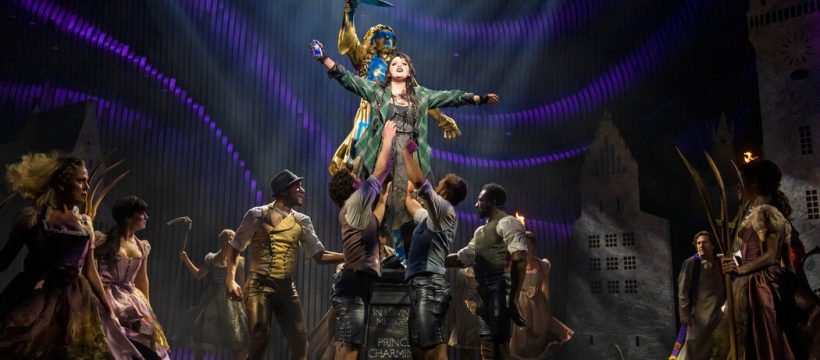LONDON — “Cinderella” finally got there, albeit well past midnight. Five weeks after the show’s aborted July 14 premiere, and with numerous other dates offered and then dropped along the way, Andrew Lloyd Webber’s new musical at last opened here Wednesday at the Gillian Lynne Theater.
And, guess what? The long-awaited show from the 73-year-old industry veteran turns out to have been worth the wait. “Cinderella” is a big, colorful production, painted in deliberately broad brushstrokes by the director Laurence Connor, that turns a time-honored story (somewhat) on its head. The result may not be quite the theatrical equivalent of its heroine’s cut-glass slipper, but it nonetheless looks set for a sturdy West End run. Best of all: “Cinderella” is fun.
Lloyd Webber has been unusually visible of late as a newly minted activist, making headlines here throughout the pandemic to score points against the British government and demand that theaters be allowed to open; this musical is on more familiar territory. Cinderella, a societal outcast, is a bit like the rejected Phantom in “The Phantom of the Opera,” and that show’s mask gets a visual reference toward the end of “Cinderella’s” first act, when the scraggly-haired, dowdy-looking “scullery wench” (Carrie Hope Fletcher) of the title is given a beauteous makeover. She finds herself in the care of a Godmother (Gloria Onitiri), who would seem to be a dab hand at plastic surgery, and within minutes Cinderella is covering her face as part of the treatment.
Her inevitable prince, too, turns out not to be the Prince Charming of legend, who is reported missing at the show’s start, but his shy and gawky younger brother, Sebastian (the sweet-faced Ivano Turco, only a year out of drama school). Cinderella’s childhood friend and lover-in-waiting, Sebastian could as well be the young Joseph from “Joseph and the Amazing Technicolor Dreamcoat,” if that earlier musical’s cheerfully asexual hero had been allowed a libido. (“Joseph” and “Phantom” are both back up and running in the West End.)
The score tilts heavily toward the power ballads that tumble from this composer’s pen; one or two could be trimmed to the benefit of an overlong production. The aggressive number “Bad Cinderella” early on establishes the gifted Fletcher’s clarion-voiced rebel as a troublemaker amid the manicured environs of the show’s “picturesque” French setting, where everyone is devoted to beauty and physical perfection. (That would explain the frequent emergence among the townsfolk of various muscled, bare-chested men, apparently on loan from a Chippendales revue.)
Sebastian gets an earworm number of his own in the emotive “Only You, Lonely You,” which ends with the same sort of money note as “Love Changes Everything,” from Lloyd Webber’s “Aspects of Love.” Elsewhere, in a second-act waltz, we clock nods toward Rodgers and Hammerstein, who wrote their own “Cinderella,” and, separately, to Edward Elgar at his most ceremonially British; a showstopping duet, “I Know You,” for the Queen and the Stepmother, by contrast, has a more Gallic tinge.
Those supporting roles are played to comic perfection by Rebecca Trehearn and Victoria Hamilton-Barritt: A florid Hamilton-Barritt, in particular, vamps across Gabriela Tylesova’s elegantly shifting sets like an Edward Gorey figure who has had too much to drink. Trehearn, for her part, raises haughtiness to a high art: “I can’t lose my head,” she announces. “Where would all my hats go?”
Here, as elsewhere, you feel the enlivening touch of a collaborative team that includes Tony-winner David Zippel (“City of Angels”) whose lyrics rhyme “nondescript” with “ripped” while also accommodating the story’s swoony romanticism. The notably bawdy book is by Emerald Fennell, an Oscar-winner this year for her script for “Promising Young Woman,” who springs several narrative surprises along the way — an important one will be immediately clear to those who read the cast list. (And surely her appearance in “The Crown” as Camilla Parker Bowles equipped Fennell for a musical that features its own royal wedding.)
In keeping with other musicals like “Wicked,” to which “Cinderella” owes an evident debt, the emphasis here is on learning to love and trust your inner beauty, rather than seeking approval elsewhere. In context, it’s no accident that Cinderella tells Sebastian, in a moment of mock petulance, “I can’t help being a legend,” before coming to realize that she might actually deserve that exalted status.
I doubt “Cinderella” itself will ever be a show of legend, but its fairy-tale rewrite feels like a happy corrective to grim times: Cinderella arrives at the ball, by which point the audience has had one, as well.
Cinderella
At the Gillian Lynne Theater, in London; andrewlloydwebberscinderella.com.
Source: Read Full Article
